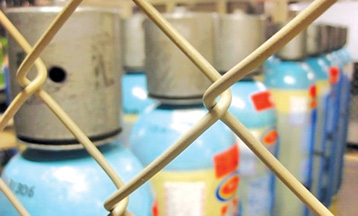Workshop to upgrade industrial chemical expertise
Sri Lanka, launched its first-ever technical sessions on industrial
chemicals last week and a top team from the Hague's Organisation for the
Prohibition of Chemical Weapons (OPCW), was here to upgrade Sri Lanka's
industrial chemical expertise to the next level.
“Chemical safety and security measures help to prevent re-emergence
of chemical weapons and misuse of toxic chemicals. The SAARC region has
become important for our overview,” the Lankan-born Deputy Director
General of the (OPCW), Ms Grace Asirwatham told a workshop on ‘Chemical
Security and Safety for Sustainable Industrial Development’ for Member
States of the OPCW in the SAARC, in Colombo recently.
Representatives of the OPCW, SAARC countries (Afghanistan,
Bangladesh, India, the Maldives, Nepal, Pakistan) and observing
countries (USA, Qatar)were present.
 Among the Lankan private sector firms, representatives of Holcim
Lanka, A Baur & Co, Janet Ayurvedic Ltd and Sanichem (Pvt) Ltd while
representatives from the Army, Navy, Police, and Customs were also
present. Among the Lankan private sector firms, representatives of Holcim
Lanka, A Baur & Co, Janet Ayurvedic Ltd and Sanichem (Pvt) Ltd while
representatives from the Army, Navy, Police, and Customs were also
present.
The Chemical Weapons Convention (CWC) is an international treaty for
the prohibition of the development, production, transfer, stockpiling
and use of chemical weapons and on their destruction. Sri Lanka ratified
the Chemical Weapons Convention in August 1994. Chemical Weapons
Convention Act No. 58 of 2007 has been enforced since August 2008.
“Chemical security is an area of increasing priority. Our focus is
gradually shifting from destruction of chemical weapons to preventing
its re-emergence. This is happening against the backdrop of a changing
landscape and impressive advances in science and technology,” said
Deputy Director General Asirwatham.
“There is increasing globalisation of the chemical industry and a
growing threat from non-State actors. The world has changed considerably
since 1993 when the chemical weapons convention was opened for
signature,” she said.
“Advances in science and technology have created new risks. That is
why enhancing chemical safety and security is important in our
collective efforts to reduce the risks posed by toxic chemicals,” the
Deputy Director General said.
“This not only helps us to enhance implementation of the convention
but also helps to protect our population against exposure to dangerous
chemicals. Chemical safety and security measures also helps prevent
re-emergence of chemical weapons and misuse of toxic chemicals,” she
said.
“We must be alert to present and future challenges. We need to focus
on two key areas. First is capacity building among State parties and
second, creating a more robust safety and security culture,” Asirwatham
said.
“Measures to monitor the chemical industry need to be updated and
upgraded if they are to keep pace with new developments. For its part,
OPCW plays the role of a catalyst triggering national processes in State
parties and also acts as a clearing house making available information
and tools matching the needs of State parties,” she said.
|

